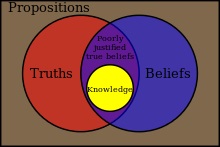|
|
| |
|
|
| |
|
|
|
|
| |
 |
| An Euler diagram
representing the traditional definition of
knowledge as justified true belief. The Gettier
problem gives us reason to think that not all
justified true beliefs constitute knowledge. |
Epistemology
Epistemology is the philosophy of knowledge. It seeks to
answer the questions "What is knowledge?" and "How is
knowledge acquired?"
Epistemologists are philosophers who are interested in
questions such as whether it is possible to have
knowledge, what kind of knowledge there is, and how
people come to know things. |
|
One of the first philosophers to make a clear statement
on these questions was Xenophanes (570–470 BC). The
following saying was, and still is, famous:
"Certain truth has no man... for even if he ever
succeeds in saying what is true, he will never know it".
This is an early kind of skepticism. |
|
|
Some positions |
- Knowing how vs. knowing that: This
was an idea of Gilbert Ryle. Moral questions, for
example, may come down to knowing how to behave. Science
could be about knowing that something is the case.
- Rational vs. empirical knowledge:
Rational knowledge (if it exists) is knowledge built up
from a person's internal thought. Empirical knowledge is
built up from what is received through the senses.
- Error: Knowledge cannot err vs. the
possibility of making mistakes is an essential part of
knowledge (Ludwig Wittgenstein).
|
|
There are other debates of this kind. |
|
|
|
|
|
|
|
|
|
|
|
|
|
|
|
|
|
|
Search Fun Easy English |
|
|
|
|
|
|
|
|
|
|
|
|
|
|
|
About
Contact
Copyright
Resources
Site Map |